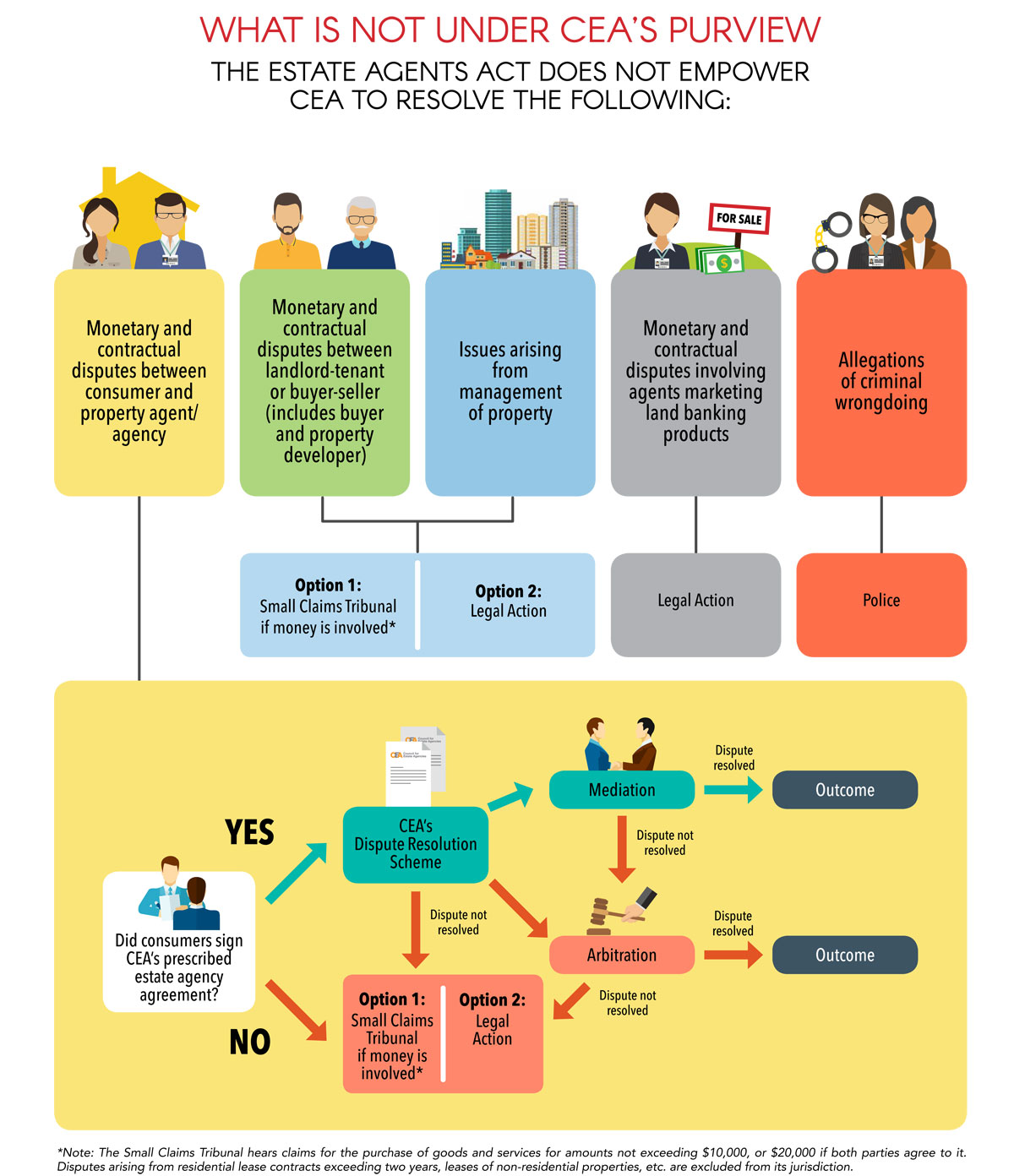You engage a property agent to help you to buy an apartment. However, he gave you some wrong advice and even misrepresented some crucial figures on the property. There is also a dispute on the commission amount payable. You are unhappy with the agent and decide to lodge a complaint against him to the Council for Estate Agencies (CEA).
After receiving your online complaint, CEA informs you that they’ll look into the matters on wrong advice and misrepresentation on the agent’s part, but are unable to assist in the commission dispute. Why is this the case?
Types of complaints that CEA handles
CEA looks into complaints against licensed property agencies and registered agents in their conduct of estate agency work. They are empowered to investigate complaints against agents for any possible breach of the Estate Agents Act, including the Code of Ethics and Professional Client Care (CEPCC), and impose penalties if a breach is proven.
Some common complaints CEA receives against agents include advertisements with misleading information, unprofessional agents, misconduct and misrepresentation by agents.
CEA also looks into complaints against entities or individuals suspected of conducting unlicensed or unregistered estate agency work. If you’re thinking of engaging an individual as your agent, but you can’t find his name in CEA’s Public Register, it means that the individual is not a registered agent. You should report him to CEA immediately.
If you’re lodging a complaint against a property agency or agent, be specific in your complaint. Provide a brief description of the case and include all the supporting documents. This will aid CEA greatly in their investigations.

CEA takes all complaints seriously. The complaint form will form part of the documents required if they subsequently charge the entity or individual in Court or take disciplinary action against them before a Disciplinary Committee.
In addition, it is an offence under the Penal Code to provide false or misleading documents or statements. You may be subject to prosecution and upon conviction, there may be a fine not exceeding S$5,000, imprisonment of one year, or both.
How CEA conducts investigations
After receiving the case, an investigation officer will review and assess the available information and evidence.
As part of the investigation, the officer may interview the complainant, the agent being complained against, witnesses and other related parties to obtain statements detailing their accounts of the events. The officer could also get reports from the property agent on the matter and visit the site if needed. The investigation will naturally take some time, depending on the complexity of the case and the volume of complaints received by CEA.
After gathering all the information and evidence, CEA will evaluate each case carefully before deciding on the next course of action.
If there is sufficient evidence to substantiate the allegation, CEA will take the appropriate action against the property agent or agency. CEA could issue Letters of Advice or impose composition fines for certain compoundable offences on errant agencies and agents. They could subject the agency or agent to disciplinary action before a Disciplinary Committee or prosecute them in Court in cases that merit such action to be taken.
For more serious cases, CEA could subject the agency or agent to disciplinary action before a Disciplinary Committee or prosecute them in Court.
Types of issues that CEA is not empowered to resolve
On the other hand, there are some instances in which CEA is unable to resolve. This includes property agent commission disputes.
Commission disputes are considered monetary disputes between clients and agents. However, CEA can only act on complaints against agencies and agents regarding their conduct of estate agency work. So they’re not empowered to look into such monetary disputes.
CEA is typically unable to look into or follow up on issues that fall into these four categories.
Minor service lapses
If the complaint is related to minor service lapses by the property agency or agent, CEA will refer such cases to the property agency to resolve.
Examples include punctuality issues, no-show at appointments and poor communication.
Insufficient information and anonymous complaints
CEA might not be able to look into the matter if the complainant cannot provide sufficient information or evidence about the case, or if the complainant prefers to remain anonymous.
They can only act on substantiated cases with evidence. Hence, it is not possible for CEA to look into anonymous complainants.
Under another agency’s purview
Upon receiving a complaint, CEA will assess if the case falls within CEA’s ambit or if it comes under the purview of another government agency. If it is the latter, they will direct the case to the appropriate agency to handle.
Outside CEA’s purview
CEA is unable to handle complaints and disputes that fall outside of the conduct of estate agency work.
This includes monetary and contractual disputes between parties, property management and criminal wrongdoing. Check out the infographic below to understand more.

Resolving monetary and contractual disputes
If you have any monetary and contractual disputes with a property agent or agency, be sure to approach the property agency to resolve the matter first.
If it remains unresolved, and you have signed an estate agency agreement earlier to engage the property agency to facilitate your property transaction, you can consider using CEA’s Dispute Resolution Scheme.
The Dispute Resolution Scheme consists of two approaches – mediation or arbitration – to resolve the dispute.
During a mediation, the mediator will facilitate the consumer and property agency to resolve a dispute and come to a mutually acceptable agreement. The decision is left to the parties and is not dictated by the mediator.
On the other hand, for arbitration, the arbitrator will consider the issues of both parties and arrive at a decision that is binding for both.
This article was republished from the Council of Estate Agencies (CEA) website. Check out the original article.
Have you experienced any disputes with property agents? Let us know in the comments section below or on our Facebook post.
If you found this article helpful, 99.co recommends Understanding property agent’s conflict of interests and CEA teams up with 99.co and other stakeholders to clamp down on fake property listings.
Looking for a property? Find the home of your dreams today on Singapore’s fastest-growing property portal 99.co! If you would like to estimate the potential value of your property, check out 99.co’s Property Value Tool for free. Also, don’t forget to join our Facebook community page or Telegram chat group! Meanwhile, if you have an interesting property-related story to share with us, drop us a message here — and we’ll review it and get back to you.
The post Managing property agent complaints and disputes appeared first on 99.co.


